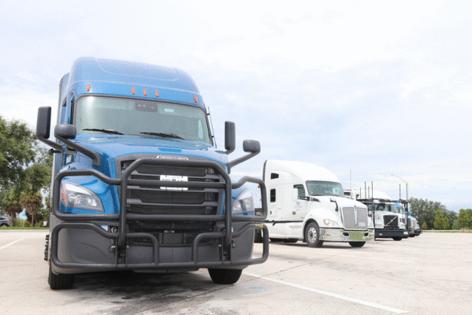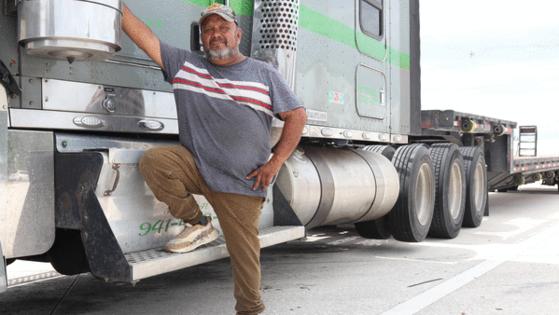Florida's newest immigration checkpoints: Agricultural inspection stations
Published in News & Features
Florida’s agricultural inspection stations will double as immigration checkpoints for truck drivers, a move that is drawing mixed reactions from those behind the wheel.
Attorney General James Uthmeier said Monday the stations will check drivers’ compliance with federal English-language requirements. Licenses issued by states that allow immigrants without legal status to apply will be targeted.
“If you’re here illegally or can’t speak English, you have no business operating large commercial vehicles on Florida’s roads,” Uthmeier said.
Florida operates 23 agricultural inspection stations through the Department of Agriculture and Consumer Services. Most are along major highways in the northern part of the state.
The announcement came two weeks after a fatal Aug. 12 crash in which police said truck driver Harjinder Singh made an illegal U-turn that killed three people. Singh, who illegally entered the United States through the southern border in 2018, later obtained commercial licenses in Washington and California. Singh is being held in a St. Lucie County jail and faces three counts of vehicular homicide and three counts of manslaughter. According to an arrest report obtained by the Times/Herald, Florida Highway Patrol troopers did not question the driver’s immigration status for two days.
Uthmeier sent a letter urging the U.S. Department of Transportation to revoke California and Washington’s commercial license authority and related federal funding.
“Decertification for California and Washington under the present circumstances would also match the tone set by President Trump on his first day back in office,” the letter reads.
California, Washington and New Mexico could lose millions in federal funding if they don’t enforce English requirements for truck drivers, Transportation Secretary Sean Duffy said Tuesday. Singh was stopped for speeding in New Mexico last year, according to the Associated Press, but was still allowed to keep driving his truck.
Florida Department of Agriculture and Consumer Services officers were certified in July to enforce federal immigration laws through a partnership with Immigration and Customs Enforcement.
Simpson said officers are stationed at interdiction checkpoints to work with federal and state partners on immigration enforcement and checking for English proficiency among commercial drivers, while continuing agricultural inspections.
Trucks, vans, trailers, and any vehicles carrying agricultural, horticultural, or livestock products are screened at these stations on 19 highways to and from Florida. The Office of Agricultural Law Enforcement, part of the Florida Department of Agriculture and Consumer Services, has 204 employees assigned to those operations.
Trump signed an executive order on April 28 reinforcing a federal law that requires commercial truck drivers to be proficient in English. The rule had been relaxed under the Obama administration in 2016.
In Florida, some truck drivers see the checkpoints as necessary for safety. Others are not so sure.
Ricardo Gonzalez, 55, a Mexican trucker who lives in Sarasota and hauls freight in and out of Florida, said the issue becomes more complicated when immigration enforcement is layered on top of safety inspections.
“Anyone driving a trailer or a big rig has some type of legal permit, right?” Gonzalez said. Singh’s case should not be used to cast suspicion on all immigrant drivers, many of whom are licensed professionals who keep the industry running, he said.
“Many, it’s true, do not speak English or understand it well,” he said. “But I do not agree with this becoming a hunt for people. I don’t want to see that.”
Evelyn Davila, a Florida truck driver who covers the East Coast, said security is essential in the trucking industry. Most drivers, she said, follow the rules and do things the right way, but there are always a few who do not.
Davila worries that new rules could harm truckers doing their jobs legally. Additional inspections, she said, could slow deliveries and interrupt tight schedules drivers depend on to make a living.
“Time is fundamental for us,” she said. “It is money that you either lose or gain.”
Eliezer Soto, a Puerto Rican trucker, said the checkpoints could not only ensnare truck drivers who are in the middle of a legal process to obtain permanent legal status but also citizens and legal residents who get caught up in tougher enforcement.
Florida has more than 99,000 heavy-truck drivers, federal records show. Nationwide, about 18% of truckers are foreign-born.
Earlier this month, Secretary of State Marco Rubio announced on X that he is pausing all issuance of worker visas for commercial truck drivers.
“The increasing number of foreign drivers operating large tractor-trailer trucks on U.S. roads is endangering American lives and undercutting the livelihoods of American truckers,” wrote Rubio.
Soto, 49, said he fears the crackdown will make immigrant drivers feel singled out and less willing to take jobs in Florida.
Nationwide, Florida ranks among the states with the highest share of intrastate shipments by value, according to the U.S. Department of Transportation. Hawaii had the highest share, followed by Florida, Texas, and Louisiana.
According to a 2023 report by TRIP, a transportation research nonprofit, Florida’s freight system moved about 839 million tons of goods worth $1.1 trillion, the eighth largest total among states.
“If someone does not have the right permit or the ID and can be detained at these checkpoints and maybe deported, many people will not want to drive in Florida,” Soto said.
_____
©2025 Tampa Bay Times. Visit tampabay.com. Distributed by Tribune Content Agency, LLC.










Comments